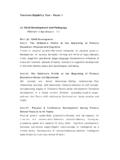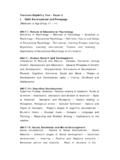Transcription of TEACHING, PEDAGOGY AND PRACTICE IN EARLY YEARS …
1 Teaching, PEDAGOGY and PRACTICE in EARLY YEARS childcare: An evidence review1 EARLY Intervention Foundation | 2018 TEACHING, PEDAGOGY AND PRACTICE IN EARLY YEARS CHILDCARE: AN EVIDENCE REVIEWAUGUST 2018 Megan Sim, Julie B langer, Lucy Hocking, Sashka Dimova, Eleftheria Iakovidou, Barbara Janta (RAND Europe) and William Teager (EIF)Teaching, PEDAGOGY and PRACTICE in EARLY YEARS childcare: An evidence review2 EARLY Intervention Foundation | 2018 ACKNOWLEDGMENTSThis report has benefited from a range of helpful contributions. In particular, we are grateful to the members of the steering group, who offered their time and expertise in proving feedback on the methodology, research design and emerging findings. The steering group consisted of: Dr Hannah Collyer (Department for Education), Matthew van Poortvliet (Education Endowment Foundation), Jo Hutchinson (Education Policy Institute), Dr Sara Bonetti (Education Policy Institute), Hanne Jensen (Lego Foundation) and Tom McBride ( EARLY Intervention Foundation).
2 At RAND Europe, in addition to the named authors, we are also thankful for the assistance of Kiera Mundry, Sachi Yagyu and Jody Larkin, for their work carrying out the database searches. We would also like to thank the quality assurance reviewers at RAND Europe, Axelle Devaux and Dr Alex Sutherland, for their helpful and constructive comments on draft versions of this report. Nevertheless, all views expressed in this report reflect those of the authors Intervention Foundation 10 Salamanca PlaceLondon SE1 7 HBW: : @TheEIFoundation P: +44 (0)20 3542 2481 This paper was first published in August 2018. 2018 The aim of this report is to support policymakers, practitioners and commissioners to make informed choices. We have reviewed data from authoritative sources but this analysis must be seen as supplement to, rather than a substitute for, professional judgment.
3 The What Works Network is not responsible for, and cannot guarantee the accuracy of, any analysis produced or cited is a registered charity (1152605) and a company limited by guarantee (8066785).About RAND EuropeRAND Europe is an independent not-for-profit policy research organisation that aims to improve policy and decision-making in the public interest through research and analysis. This report has been peer-reviewed in accordance with RAND s quality assurance , PEDAGOGY and PRACTICE in EARLY YEARS childcare: An evidence review3 EARLY Intervention Foundation 2018 ContentsForeword ..5 Summary ..7 Context for the review ..7 Methodology ..8 Headline findings ..8 Findings on language and literacy outcomes ..9 Findings on numeracy or mathematics outcomes ..10 Findings on other cognitive outcomes ..10 Findings on socio-emotional outcomes ..10 Findings on physical outcomes.
4 11 Recommendations for future research ..11 Abbreviations ..131. Introduction .. Background to the review .. English policy context .. Theories of child development and their relationship to policies and PRACTICE .. The evidence suggests that process quality has an impact on children s outcomes 192. Methodology: systematic rapid evidence assessment .. Research aims, objectives and questions of the REA .. REA inclusion/exclusion criteria and overview of search results ..263. Overview of key findings .. Overview of the included studies .. Overview of the teaching, PEDAGOGY and practices covered .. Overview of children s outcomes ..304. Impact of EARLY YEARS practices on language and literacy outcomes .. Headline findings .. Summary of evidence ..325. Impact of EARLY YEARS practices on numeracy or mathematics outcomes .. Headline findings .. Summary of evidence.
5 35 Teaching, PEDAGOGY and PRACTICE in EARLY YEARS childcare: An evidence review4 EARLY Intervention Foundation 20186. Impact of EARLY YEARS practices on other cognitive outcomes .. Headline findings .. Summary of evidence ..387. Impact of EARLY YEARS practices on socio-emotional outcomes .. Headline findings .. Summary of evidence ..418. Impact of EARLY YEARS practices on physical Headline findings .. Summary of evidence ..449. Discussion .. Strengths and limitations .. Future research needed to strengthen the evidence base ..47 References ..49 Teaching, PEDAGOGY and PRACTICE in EARLY YEARS childcare: An evidence review5 EARLY Intervention Foundation 2018 ForewordThe EARLY YEARS of a child s life is a period of rapid and profound change. The potential of EARLY childhood education and care (ECEC) to support child development , in particular that of children from a disadvantaged background, has long been recognised.
6 In the UK, the Effective Pre-School, Primary and Secondary Education project (EPPSE) provides some indication that high-quality ECEC is associated with long-term improvements in outcomes, with particularly strong long-run effects for children with parents who have lower levels of body of research into ECEC is broad and deep, drawing on multiple academic fields and philosophical schools of thought, and using a wide range of research methods. While an obvious strength, this richness and diversity can make the evidence base difficult to access, and challenging, especially for non-experts, to discern the strength of the evidence that underpins various claims. With this in mind we set out to produce a clear and accessible overview of the literature on effective PEDAGOGY and PRACTICE , focusing on studies with high-quality empirical evidence of impact. We believe this report is the first of its kind, and we have reviewed over 100 studies from the last 10 YEARS which have used rigorous methods to assess impact.
7 The majority of these studies come from the US, focus on children over the age of 3, and do not analyse the differential impact on disadvantaged groups or long-term impacts. This limits the generalisability of these findings to the UK and their applicability to the government s agenda on improving social mobility by reducing the social gradient of educational outcomes, and we make specific recommendations on research to address this. However, our aim is to go beyond this and make recommendations which influence policy and PRACTICE directly, although the limitations of the evidence base makes this challenging. This is principally because most studies do not test specific pedagogical practices in isolation, and so do not allow us to easily identify the active ingredients which make them work, limiting our ability to say with certainty what specific pedagogical practices have been shown to work.
8 Nevertheless, this report adds to our knowledge of the wider literature on EARLY YEARS and child development , allowing us to make recommendations about the areas which show promise in terms of supporting the development of children from disadvantaged backgrounds. Disadvantaged children underperform educationally partly because on average they experience more risk factors, including poor parenting and home learning environments which impede their cognitive development . If the intention is that ECEC is to at least partially compensate for this, then in our view there are important principles to bear in mind: Interventions which seek to address multiple causes of educational underperformance for disadvantaged children may have a better chance of success. EIF concludes in the forthcoming report on EARLY childhood competencies2 that two-generation models of ECEC, supporting both parent and child , are a promising way of improving outcomes for disadvantaged 1 A compendium of reports, abstracts, briefs and papers can be found at Key competencies in EARLY cognitive development : Objects, people, numbers and words (forthcoming).
9 Teaching, PEDAGOGY and PRACTICE in EARLY YEARS childcare: An evidence review6 EARLY Intervention Foundation 2018children, as they address multiple risk factors. Although the impact on parents and parenting behaviours has not been extensively evaluated to date, two-generation models that combine support for parents with enriching childcare for children seem well placed to enhance development . Such models provide stimulating and high-quality ECEC for children, and help parents to better engage with children s development . Head Start is a prominent example of a two-generational model. Our review shows that there are high-quality studies that evaluated Head Start, suggesting that a broad and holistic approach which combines delivery by well-qualified individuals with active screening and monitoring of children s progress can improve long-term outcomes for disadvantaged children.
10 The calibre of ECEC professionals likely matters. The skills of EARLY YEARS professionals are usually considered an element of structural quality, and so outside the scope of our review, but higher pre-service qualifications and in-service training have been found to be associated with the provision of higher-quality and stimulating ECEC activities (OECD, 2018). While further evaluation is needed of the relative benefits of using graduates or teachers to deliver ECEC and of the optimal level and type of in-service training in the UK context, there is reason to think that a greater focus on the skills of professionals could be a mechanism to deliver improvements in outcomes for disadvantaged review offers a significant contribution to the field of what works in EARLY YEARS PEDAGOGY and PRACTICE . Based on our findings we are able to make specific recommendations about what research is needed to significantly improve the evidence base in the UK.













